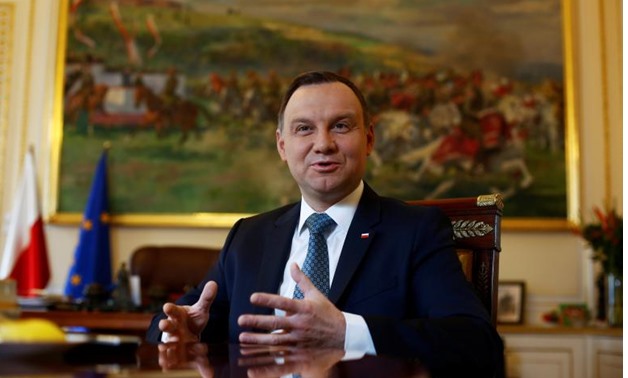
Andrzej Duda - Reuters
Warsaw, July 23, 2017 (AFP) -Polish freedom icon Lech Walesa joined in Saturday the protests against a proposed reform of the nation's Supreme Court, urging Poles to protect their democracy with "all means".
The measure, which opponents say imperils the independence of the judiciary, has already drawn a threat of sanctions from the European Union and massive street demonstrations.
"Our generation succeeded in putting Poland back on track and ensuring the separation of powers," the former president said in the northern city of Gdansk. "We cannot allow anyone to destroy that."
The 73-year-old, who recently underwent cardiac testing, said "despite my health, I will always be with you."
"In 1989 we gave you a democratic Poland. You must fight for it with all means," said Walesa who won the Nobel Peace Prize in 1983 for leading Solidarity, the Soviet bloc's only free trade union.
Early on Saturday Poland's senate approved the reform, which gives the government power to select candidates for the court. The lower house of parliament backed the measure in a vote on Thursday.
In order to become law the reform would need the signature of President Andrzej Duda and he is closely allied with the ruling conservative Law and Justice (PiS) party.
The head of state has 21 days to sign the document, veto it, or, if in doubt, submit it to the constitutional court.
The opposition and protesters are all calling on Duda to veto the reform, as well as two other measures recently adopted which they say increase the control of the executive branch of government over the judiciary.
The opposition argues the measures amount to a "coup d'etat" but the PiS says the reforms are essential to rationalise the judicial system and fight corruption.
The PiS, which began making judiciary changes after coming to power in late 2015, has argued resistance to the initiatives is a case of the elite defending their privileges.
Under the current system, candidates for the Supreme Court are selected by an independent body consisting mainly of judges but also including a few politicians.
The European Commission has warned against the changes, threatening to halt Poland's voting rights in the 28-nation bloc further down the line -- a so-called "nuclear option" that the EU had never invoked.

Comments
Leave a Comment